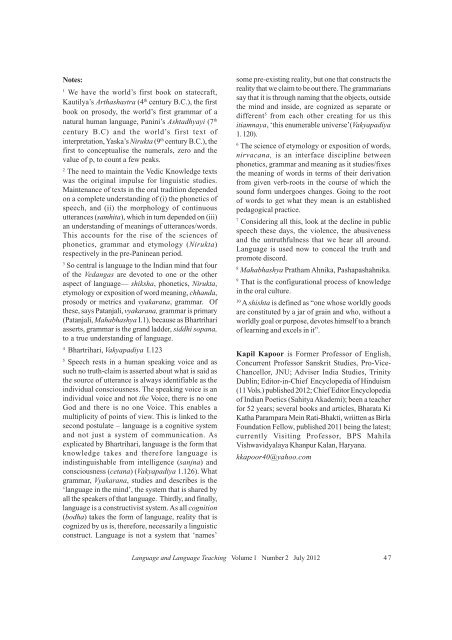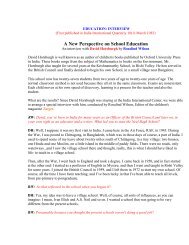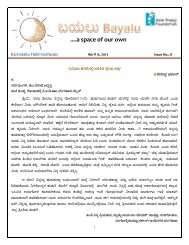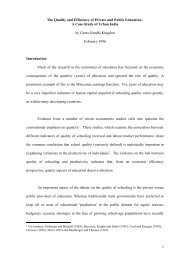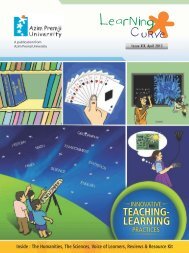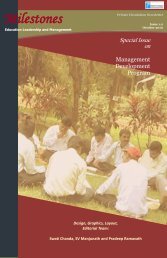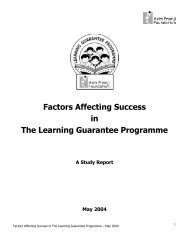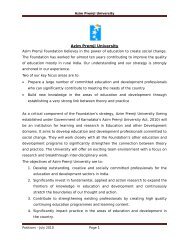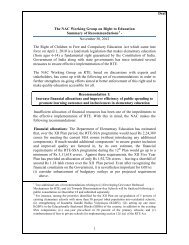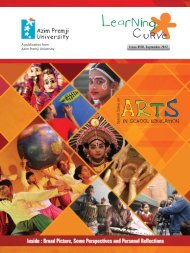Language and Language Teaching, Issue 2 - Azim Premji Foundation
Language and Language Teaching, Issue 2 - Azim Premji Foundation
Language and Language Teaching, Issue 2 - Azim Premji Foundation
You also want an ePaper? Increase the reach of your titles
YUMPU automatically turns print PDFs into web optimized ePapers that Google loves.
Notes:1We have the world’s first book on statecraft,Kautilya’s Arthashastra (4 th century B.C.), the firstbook on prosody, the world’s first grammar of anatural human language, Panini’s Ashtadhyayi (7 thcentury B.C) <strong>and</strong> the world’s first text ofinterpretation, Yaska’s Nirukta (9 th century B.C.), thefirst to conceptualise the numerals, zero <strong>and</strong> thevalue of p, to count a few peaks.2The need to maintain the Vedic Knowledge textswas the original impulse for linguistic studies.Maintenance of texts in the oral tradition dependedon a complete underst<strong>and</strong>ing of (i) the phonetics ofspeech, <strong>and</strong> (ii) the morphology of continuousutterances (samhita), which in turn depended on (iii)an underst<strong>and</strong>ing of meanings of utterances/words.This accounts for the rise of the sciences ofphonetics, grammar <strong>and</strong> etymology (Nirukta)respectively in the pre-Paninean period.3So central is language to the Indian mind that fourof the Vedangas are devoted to one or the otheraspect of language— shiksha, phonetics, Nirukta,etymology or exposition of word meaning, chh<strong>and</strong>a,prosody or metrics <strong>and</strong> vyakarana, grammar. Ofthese, says Patanjali, vyakarana, grammar is primary(Patanjali, Mahabhashya I.1), because as Bhartrihariasserts, grammar is the gr<strong>and</strong> ladder, siddhi sopana,to a true underst<strong>and</strong>ing of language.4Bhartrihari, Vakyapadiya I.1235Speech rests in a human speaking voice <strong>and</strong> assuch no truth-claim is asserted about what is said asthe source of utterance is always identifiable as theindividual consciousness. The speaking voice is anindividual voice <strong>and</strong> not the Voice, there is no oneGod <strong>and</strong> there is no one Voice. This enables amultiplicity of points of view. This is linked to thesecond postulate – language is a cognitive system<strong>and</strong> not just a system of communication. Asexplicated by Bhartrihari, language is the form thatknowledge takes <strong>and</strong> therefore language isindistinguishable from intelligence (sanjna) <strong>and</strong>consciousness (cetana) (Vakyapadiya 1.126). Whatgrammar, Vyakarana, studies <strong>and</strong> describes is the‘language in the mind’, the system that is shared byall the speakers of that language. Thirdly, <strong>and</strong> finally,language is a constructivist system. As all cognition(bodha) takes the form of language, reality that iscognized by us is, therefore, necessarily a linguisticconstruct. <strong>Language</strong> is not a system that ‘names’some pre-existing reality, but one that constructs thereality that we claim to be out there. The grammarianssay that it is through naming that the objects, outsidethe mind <strong>and</strong> inside, are cognized as separate ordifferent 5 from each other creating for us thisitiamnaya, ‘this enumerable universe’(Vakyapadiya1. 120).6The science of etymology or exposition of words,nirvacana, is an interface discipline betweenphonetics, grammar <strong>and</strong> meaning as it studies/fixesthe meaning of words in terms of their derivationfrom given verb-roots in the course of which thesound form undergoes changes. Going to the rootof words to get what they mean is an establishedpedagogical practice.7Considering all this, look at the decline in publicspeech these days, the violence, the abusiveness<strong>and</strong> the untruthfulness that we hear all around.<strong>Language</strong> is used now to conceal the truth <strong>and</strong>promote discord.8Mahabhashya Pratham Ahnika, Pashapashahnika.9That is the configurational process of knowledgein the oral culture.10A shishta is defined as “one whose worldly goodsare constituted by a jar of grain <strong>and</strong> who, without aworldly goal or purpose, devotes himself to a branchof learning <strong>and</strong> excels in it”.Kapil Kapoor is Former Professor of English,Concurrent Professor Sanskrit Studies, Pro-Vice-Chancellor, JNU; Adviser India Studies, TrinityDublin; Editor-in-Chief Encyclopedia of Hinduism(11 Vols.) published 2012; Chief Editor Encyclopediaof Indian Poetics (Sahitya Akademi); been a teacherfor 52 years; several books <strong>and</strong> articles, Bharata KiKatha Parampara Mein Rati-Bhakti, wriitten as Birla<strong>Foundation</strong> Fellow, published 2011 being the latest;currently Visiting Professor, BPS MahilaVishwavidyalaya Khanpur Kalan, Haryana.kkapoor40@yahoo.com<strong>Language</strong> <strong>and</strong> <strong>Language</strong> <strong>Teaching</strong> Volume 1 Number 2 July 2012 47


